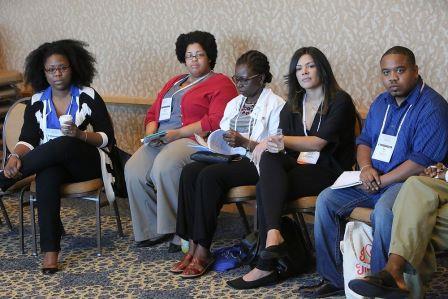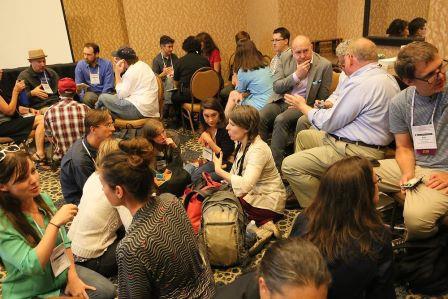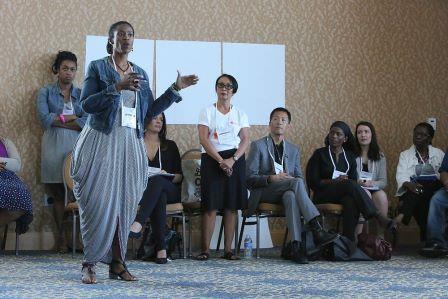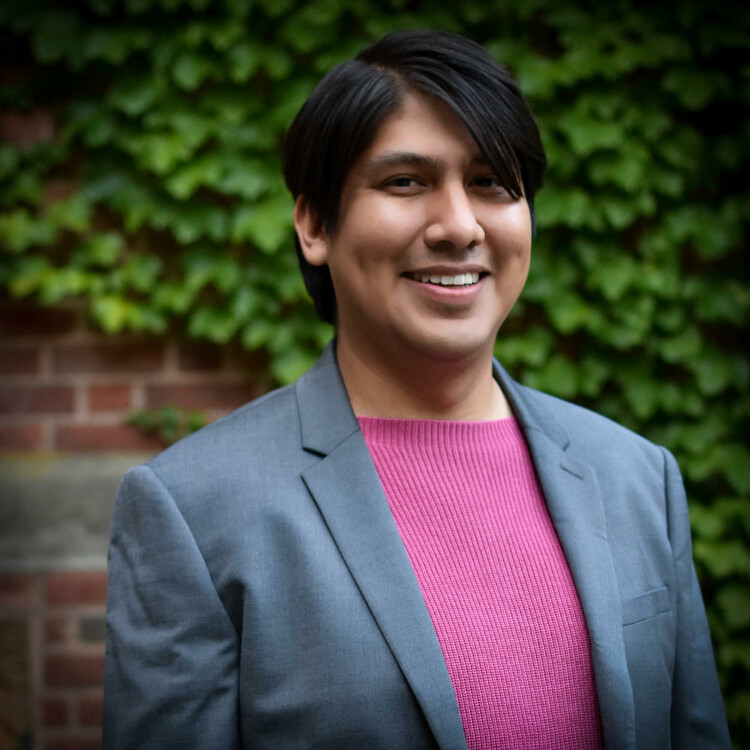A More Equal Theater
As part of the Café Onda soft launch this summer, we asked five authors from different places in the generational map, at different stages of their career, to open their hearts and their minds for us to reflect on their experience at the 2014 TCG National Conference: Crossing Borders. This is the fifth and final post in the series.

Photo by Michael Daniel.
This year’s TCG Conference, themed “Crossing Borders” with a focus on Diversity & Inclusion, felt very much divided into two conferences. One conference worked like a traditional business conference on not-for-profit theater, at times a productive conversation, and other times broad and diluted. The second one facilitated a conversation based on affinities, as defined for the purpose of the week, around four topics: gender, ability, sexual orientation, and race/ethnicity (more on the TCG Affinity Groups here). For the first time, TCG formally dedicated time to these groups in sessions that would typically happen unofficially throughout the conference. The charged identity politics of these affinity groups versus the almost clinical discussion of business models contributed to the “two conference” feel.
At the “second” conference, I was particularly struck by the use of the term “ally.” The first instance was in the title of an affinity group called “White Allies,” which took place during the race/ethnicity affinity group sessions (Latina/o, African/African American/Black, Native American/Alaska Native/Hawaiian & First Nations, Asian Pacific Islander, Mixed Race, etc.). Another use of the word ally occurred during the Intergenerational Leaders of Color meeting immediately following the race/ethnicity affinity groups; someone offered to the group the idea of intercultural allyship as a form of preventing the perpetuation of stereotypes among theaters of color.

Photo by Michael Daniel.
This tidal change in demographics is a drastically different environment for nurturing allyship than that of the LGBT community. Deeper intercultural relationships will dictate the meaningfulness of exacting the same demographic shifts in our organizations.
As a queer person, the word ally brings to mind several friends who are my straight allies. To be an ally in this case means more than to be tolerant, or even sensitive to queer issues. In fact, even the TCG website defines an ally as “someone who understands the many layers of oppression, can identify positions of privilege that they hold, and actively works to rectify inequity,” mirroring the role of allies in the LGBT movement. The process of becoming an ally to the queer community mirrors that of the developmental process of LGBT people themselves and is even spoken of in shared terms. LGBT allies also have to “come out” as such. The percentage of LGBT people represented in the general population is small enough that it necessitates inviting people from the “outside” in order to make change. Straight allies are an integral part of the movement.
Does this logic translate to the conversation around people of color and white allies? The turn of phrase strikes me as awkward and messy, but maybe that’s okay for now. Conference participants were at different points on the ally spectrum. They were also at varying levels of willingness to engage in the dialogue. It is anticipated that in 2042 racial/ethnic minorities will make up the majority of our nation’s population (as projected by the US Census Bureau). This tidal change in demographics is a drastically different environment for nurturing allyship than that of the LGBT community. Deeper intercultural relationships will dictate the meaningfulness of exacting the same demographic shifts in our organizations. Becoming an ally is a clumsy process; at first, filled with insecurity and anxiety, but it can lead to a deeper understanding of someone else’s experience. And ultimately, it is this understanding that will serve as the foundation for breaking down systems of privilege and building a more equal theatre.

Photo by Michael Daniel.
Para pedir este articulo traducido al Español, por favor escriba a [email protected]; Titulado: Traducción para NOMBRE DEL ARTICULO.


Comments
The article is just the start of the conversation—we want to know what you think about this subject, too! HowlRound is a space for knowledge-sharing, and we welcome spirited, thoughtful, and on-topic dialogue. Find our full comments policy here
"... the foundation for breaking down systems of privilege and building a more equal theater."
Once again the emphasis is on "breaking down" the existing system. Even if the violent subtext is strictly metaphorical, why not instead focus on building your own audience rather than fight (!) for the right (?) to use the legacy of the other's labor for your own benefit?